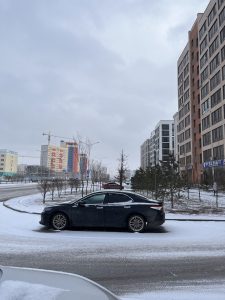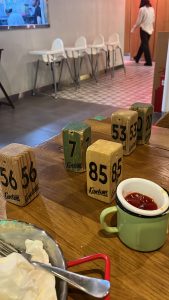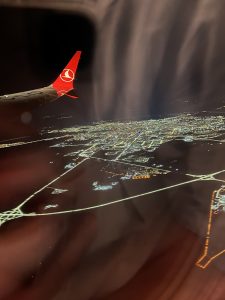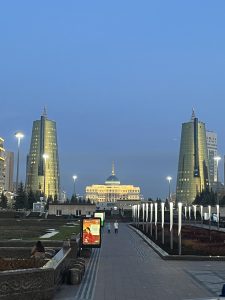
Winter comes to Astana
Deciding to retrain after lockdown in order to ‘pandemic-proof’ my future was no easy decision. What to do? How to move on from here? Having previous experience with and knowledge of languages, translation seemed a sound choice. Having decided on my path, I began my studies in my chosen languages and, before I knew it, it was time to head off to the countries in question and immerse myself in a native-language environment.

‘Family’ Dinner at Koktem
Sadly, with the War in Ukraine, my plans to study in St Petersburg were derailed and I began to look for other Russian-speaking destinations. On a recommendation, I chose Kazakhstan and its northerly capital, Astana. Thus, in August last year I was off on a long series of flights (via Istanbul) to Astana. This was new ground for me; I had never visited Kazakhstan and, apart from what I could glean from YouTube and a blog or two, knew next to nothing about it.
Touching down, I was met at the airport by the accommodation officer and, on next-to-no sleep and a black coffee, whisked off to the flat which would be my home for the next four months.
My first impression of Astana was the sheer scale of the place. As a reasonably new capital city, and one that was purpose-built, everything was wide boulevards and high-rise buildings with mirrored-glass fronts. After a weekend spent catching up with a couple of friends living in the city, it was time to start classes. On my course, we had classes every day for at least four hours a day and covered all of the important topics, from grammar and writing skills to literature and conversation. It was very full-on, and they were not going to go easy on us; my first literature class was reading and discussing Pushkin (the ‘Russian Shakespeare’) in the original Russian, which certainly challenged my reading skills.

Bye bye Astana!
Luckily for me, Astana is a bilingual city (Russian and Kazakh are used interchangeably) and English-speakers are few and far between, so it was the ideal space in which to practise Russian daily, from ordering a taxi and conversing with the driver, to picking up shopping and chatting to the lady on the till. Language learning like this is so valuable because, unlike classroom Russian, you get to experience what the daily vocabulary and lexicon are like. Disaster struck halfway through the trip when I broke a tooth and had to navigate dentistry in Russian, but somehow I managed, which felt like no mean feat!

The grand home of the President of Kazakhstan
With daily classes and making new friends, four months was soon drawing to a close. Winter was upon us, plunging the mercury to lows of -40 Celsius some days. As I said goodbye to the people I had lived with for so long, I reflected on what I had learn and how far I had come. Sleep-deprived me, haltingly ordering a black coffee in August had given way to someone who was more conversant and, above all, more confident in my abilities. Learning any language is hard, let alone one as complex as Russian, and I am immensely grateful to my wonderful teachers for not focussing on the negatives but rather giving me positive encouragement and the space to improve.
My thanks also go to the John Speak Trust for providing invaluable financial assistance when I needed it and enabling me to focus on my language development. Without them I would not have been able to undertake my studies, and I encourage anyone looking at studying a foreign language to apply for this scholarship – you won’t regret it!
